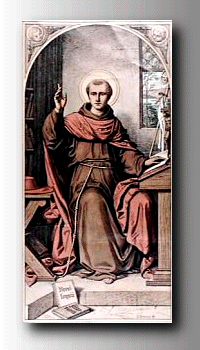Saint Bonaventure (1221 – 15 July 1274), born Giovanni di Fidanza, was an Italian medieval Franciscan, scholastic theologian and philosopher. The seventh Minister General of the Order of Friars Minor, he was also Cardinal Bishop of Albano. He was canonised on 14 April 1482 by Pope Sixtus IV and declared a Doctor of the Church in the year 1588 by Pope Sixtus V. He is known as the "Seraphic Doctor" (Latin: Doctor Seraphicus). He steered the Franciscans on a moderate and intellectual course that made them the most prominent order in the Catholic Church until the coming of the Jesuits. His theology was marked by an attempt completely to integrate faith and reason. He thought of Christ as the "one true Master" who offers humans knowledge that begins in faith, is developed through rational understanding, and is perfected by mystical union with God. Bonaventure, however, is not only a meditative thinker, whose works may form good manuals of devotion; he is a dogmatic theologian of high rank, and on all the disputed questions of scholastic thought, such as universals, matter, seminal reasons, the principle of individuation, or the intellectus agens, he gives weighty and well-reasoned decisions. He agrees with Saint Albert the Great in regarding theology as a practical science; its truths, according to his view, are peculiarly adapted to influence the affections. He discusses very carefully the nature and meaning of the divine attributes; considers universals to be the ideal forms pre-existing in the divine mind according to which things were shaped; holds matter to be pure potentiality that receives individual being and determinateness from the formative power of God, acting according to the ideas; and finally maintains that the agent intellect has no separate existence. On these and on many other points of scholastic philosophy the "Seraphic Doctor" exhibits a combination of subtlety and moderation, which makes his works particularly valuable.
In form and intent the work of St Bonaventure is always the work of a theologian; he writes as one for whom the only angle of vision and the proximate criterion of truth is the Christian faith. This fact influences his importance for the history of philosophy; when coupled with his style, it makes Bonaventure perhaps the least accessible of the major figures of the thirteenth century. This is true, not because he is a theologian, but because philosophy interests him largely as a praeparatio evangelica, as something to be interpreted as a foreshadow or deviation from what God has revealed.






